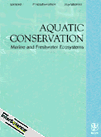
AQUATIC CONSERVATION-MARINE AND FRESHWATER ECOSYSTEMS
Scope & Guideline
Exploring the depths of marine and freshwater ecosystems.
Introduction
Aims and Scopes
- Aquatic Biodiversity Assessment:
The journal emphasizes the importance of assessing and monitoring aquatic biodiversity, including fish, invertebrates, and plant species, to inform conservation efforts and management practices. - Conservation Strategies and Management:
Research articles focus on developing and evaluating conservation strategies, including habitat restoration, species translocations, and the establishment of marine protected areas. - Impact of Anthropogenic Activities:
The journal investigates the effects of human activities such as pollution, habitat modification, and climate change on aquatic ecosystems and species. - Innovative Research Techniques:
There is a strong emphasis on the use of innovative methodologies, such as environmental DNA (eDNA) analysis, acoustic monitoring, and machine learning, to enhance conservation efforts. - Community Engagement and Citizen Science:
The journal promotes the role of community involvement and citizen science in conservation initiatives, recognizing the importance of local knowledge and public engagement.
Trending and Emerging
- Climate Change Adaptation:
Research addressing the impacts of climate change on aquatic ecosystems and species is increasingly prevalent, highlighting the need for adaptive management strategies to mitigate these effects. - Ecosystem-Based Management:
There is a strong trend towards ecosystem-based management approaches that integrate ecological, social, and economic factors into conservation planning. - Technological Innovations in Monitoring:
The use of advanced technologies, such as remote sensing, underwater drones, and eDNA, for monitoring aquatic ecosystems is on the rise, improving data collection and analysis for conservation efforts. - Collaborative Conservation Efforts:
Emerging themes focus on transboundary conservation initiatives that require collaboration between countries and stakeholders to address shared aquatic resources and species. - Biodiversity Offsetting and Restoration:
Research is increasingly exploring biodiversity offsetting strategies and the effectiveness of restoration projects to compensate for environmental impacts.
Declining or Waning
- Traditional Fisheries Management:
Research focused solely on traditional fisheries management practices is becoming less prominent, as there is a shift towards integrated approaches that consider ecosystem health and biodiversity. - Generalized Habitat Studies:
Studies that do not specify particular conservation needs or localized habitat assessments are declining, as the journal increasingly favors targeted research that addresses specific conservation challenges. - Single-Species Focus:
The emphasis on single-species studies is waning, with a growing trend towards holistic approaches that consider multi-species interactions and ecosystem dynamics. - Static Conservation Models:
There is a noticeable decrease in articles relying on static models for conservation planning, as dynamic and adaptive management strategies are becoming the focus. - Low-Impact Aquaculture:
Research related to low-impact aquaculture practices is becoming less frequent, likely due to a growing recognition of the complexities and ecological impacts associated with aquaculture.
Similar Journals

BOLETIM DO INSTITUTO DE PESCA
Illuminating emerging studies in aquatic sciences.BOLETIM DO INSTITUTO DE PESCA, published by the Instituto Pesca, is a Brazilian journal dedicated to advancing the fields of Animal Science and Aquatic Science. With its Open Access policy adopted in 2008, the journal ensures that research is widely disseminated, fostering collaboration and innovation among researchers, professionals, and students alike. Despite its recent Q4 category rankings in the 2023 metrics for both disciplines, the journal plays a vital role in providing a platform for emerging studies and critical discussions related to aquatic ecosystems and fisheries management. Covering a wide range of topics within its scope, BOLETIM DO INSTITUTO DE PESCA publishes original research, reviews, and case studies, stimulating academic dialogue and contributing to the sustainable management of aquatic resources in Brazil and beyond. This journal is an essential resource for anyone invested in marine and freshwater biology, ecology, and conservation.
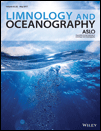
LIMNOLOGY AND OCEANOGRAPHY
Exploring the Depths of Aquatic ScienceLimnology and Oceanography is a premier peer-reviewed journal published by Wiley that has been at the forefront of aquatic sciences since its inception in 1956. With an impressive impact factor placing it in Q1 in both Aquatic Science and Oceanography categories, this journal showcases cutting-edge research and studies relevant to the dynamics of freshwater and marine ecosystems. Limnology and Oceanography serves as a vital platform for researchers, professionals, and students to disseminate their findings and foster a deeper understanding of aquatic environments. The journal does not currently offer open access, but it provides a unique opportunity for scholars to contribute to a body of work that influences policy, conservation efforts, and the scientific community at large. With its substantial ranking in Scopus as #12 in Aquatic Science and #9 in Oceanography, Limnology and Oceanography remains a critical resource for advancing knowledge in these vital fields.
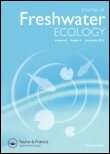
JOURNAL OF FRESHWATER ECOLOGY
Exploring the depths of aquatic science and ecology.JOURNAL OF FRESHWATER ECOLOGY, published by Taylor & Francis Inc, is an esteemed source of research dedicated to advancing the understanding of freshwater ecosystems. Established in 1981, this Open Access journal has provided a platform for innovative studies and groundbreaking articles relevant to the fields of Aquatic Science and Ecology. With its HIndex reflecting a commitment to quality scholarship, the journal is currently classified in the Q3 category for both Aquatic Science and Ecology, Evolution, Behavior and Systematics, indicating its respectable impact within these disciplines. The journal ranks within the 45th percentile in Ecology and the 41st percentile in Aquatic Science on Scopus, highlighting its relevance to a global audience of researchers and practitioners. By facilitating unrestricted access to research findings since 2017, JOURNAL OF FRESHWATER ECOLOGY aims to enrich our understanding of freshwater systems and their conservation, making it an essential resource for those invested in ecological research and environmental sustainability.
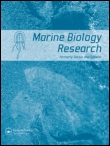
Marine Biology Research
Navigating the intersection of ecology and oceanography.Marine Biology Research is a premier journal published by Taylor & Francis, focusing on the dynamic field of marine biology and its intersecting realms of aquatic science, ecology, and oceanography. Since its inception in 2005, this journal has served as a crucial platform for researchers and professionals to disseminate their findings, with a vision extending to 2024 and beyond. The journal is recognized with a Q3 quartile ranking in both Aquatic Science and Ecology, Evolution, Behavior and Systematics, underscoring its growing influence in these fields as evidenced by its Scopus rankings. Located in the United Kingdom, Marine Biology Research aims to foster collaboration and innovation through open access options, facilitating knowledge exchange among the academic community. With a steady commitment to advancing marine sciences, this journal is an invaluable resource for those dedicated to understanding and preserving our ocean ecosystems.

Aquatic Biology
Navigating the Frontiers of Aquatic EcologyAquatic Biology, published by INTER-RESEARCH, is a leading open-access journal dedicated to the scientific exploration of aquatic ecosystems, promoting innovative research in the fields of aquatic science, ecology, and oceanography since its inception in 2007. With an E-ISSN of 1864-7782, the journal publishes original articles, reviews, and data papers that contribute to the understanding of aquatic biology in its myriad forms. As of 2023, it holds a respectable Q3 ranking across multiple categories including Aquatic Science and Ecology, reflecting its sustained impact within the scientific community. Situated in Germany, Aquatic Biology operates a policy of open access since 2014, ensuring that valuable research findings are readily available to researchers, professionals, and students worldwide, thus fostering collaboration and knowledge dissemination. By addressing diverse aquatic topics, the journal plays a crucial role in advancing the study and conservation of marine and freshwater environments, making it an essential resource for anyone seeking to deepen their understanding of aquatic systems.
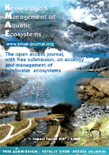
Knowledge and Management of Aquatic Ecosystems
Unveiling the Secrets of Aquatic Ecosystem ManagementKnowledge and Management of Aquatic Ecosystems, published by EDP SCIENCES S A, is a premier open-access journal dedicated to the interdisciplinary study of aquatic ecosystems. With an ISSN of 1961-9502 and an impressive history since 1928, this journal serves as a vital resource for researchers and professionals in the fields of Ecology, Aquatic Science, Water Science and Technology, and Nature Conservation. The journal has consistently achieved high rankings, including a Q2 classification in multiple categories, which underscores its significant contribution to the evolving landscape of aquatic research. With access options that promote widespread dissemination of knowledge, Knowledge and Management of Aquatic Ecosystems aims to bridge gaps in research, policy, and practical applications, making it an invaluable asset for students, researchers, and policymakers aiming for impactful solutions in aquatic management and conservation.
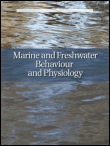
MARINE AND FRESHWATER BEHAVIOUR AND PHYSIOLOGY
Fostering Innovation in Aquatic Science and OceanographyMARINE AND FRESHWATER BEHAVIOUR AND PHYSIOLOGY, published by Taylor & Francis Ltd, is a renowned academic journal dedicated to advancing the understanding of the behavioral and physiological aspects of aquatic organisms. Established in 1994, the journal serves as a pivotal platform for researchers and professionals in the fields of Aquatic Science and Oceanography, offering valuable insights into the interactions between aquatic species and their environments. With an impact factor reflecting its significance in the academic community, it occupies a notable position in Category Quartiles, currently ranking Q3 in both Aquatic Science and Oceanography. Researchers are encouraged to explore a wide range of topics reflecting the complexity and diversity of marine and freshwater ecosystems. Although the journal is not open access, its contributions continue to influence both current research and future investigations, making it an essential resource for anyone engaged in the study of aquatic life.

GULF AND CARIBBEAN RESEARCH
Empowering Voices in Gulf and Caribbean ResearchGulf and Caribbean Research is an esteemed academic journal published by the University of Southern Mississippi, dedicated to advancing the understanding of aquatic ecosystems in the Gulf of Mexico and the Caribbean region. With an ISSN of 1528-0470 and an E-ISSN of 2572-1410, the journal serves as an essential platform for researchers and professionals in the fields of Aquatic Science, Oceanography, and Water Science and Technology, recognized in the 2023 Q3 Quartile rankings across these disciplines. The journal welcomes diverse contributions including original research, reviews, and technical notes, encouraging interdisciplinary approaches to address ecological and environmental challenges within its scope. Despite the absence of an open access option, it provides invaluable insights, evidenced by its Scopus rankings, which position it within the 31st to 33rd percentile across various related categories. The engaging research articulated in Gulf and Caribbean Research fosters dialogue and collaboration, making it a vital resource for those committed to scientific discovery and conservation efforts in these critical aquatic environments.
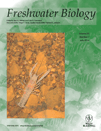
FRESHWATER BIOLOGY
Bridging Science and Conservation in Freshwater SystemsFreshwater Biology is a premier academic journal dedicated to advancing the study of freshwater ecosystems and their biological diversity. Published by Wiley, this highly esteemed journal features an impact factor that reflects its influence within the field of aquatic science, maintaining a distinguished Q1 rank as per the 2023 standards. The journal is recognized for its comprehensive coverage of original research articles, review papers, and methodological advancements that address a range of topics from ecological interactions to conservation strategies in freshwater environments. With its extensive archive dating from 1971 to 2024, Freshwater Biology serves as an invaluable resource for researchers, professionals, and students looking to deepen their understanding of aquatic systems. Though it does not currently offer Open Access options, readers can access vital findings and contribute to the ongoing discourse in this critical area of study. Based in the United Kingdom, with its commitment to rigorous peer-review and high publication standards, Freshwater Biology continues to be a cornerstone publication in the field, enhancing our understanding of freshwater ecosystems and their management.

Hidrobiologica
Diving deep into the science of aquatic environments.Hidrobiologica is a pivotal academic journal dedicated to the field of aquatic sciences and ecology, published by UNIV AUTONOMA METROPOLITANA-IZTAPALAPA in Mexico. With a commitment to fostering research from diverse ecosystems, this journal encourages the dissemination of knowledge spanning aquatic environments, ecological interactions, and marine biodiversity. Although classified in the Q4 category across various relevant fields such as Aquatic Science and Oceanography, Hidrobiologica is focused on increasing visibility and engagement among scholars by providing a platform for innovative research that addresses contemporary ecological challenges. The journal's address reflects its deep-rooted commitment to local and regional aquatic research, yet it aims to resonate with a global audience. Researchers, professionals, and students alike will find value in the journal's scope, which spans from 2007 to 2024, making it a valuable resource for understanding advancements in aquatic studies. While not an open-access journal, it continues to be a significant contributor to the academic dialogue in aquatic sciences.